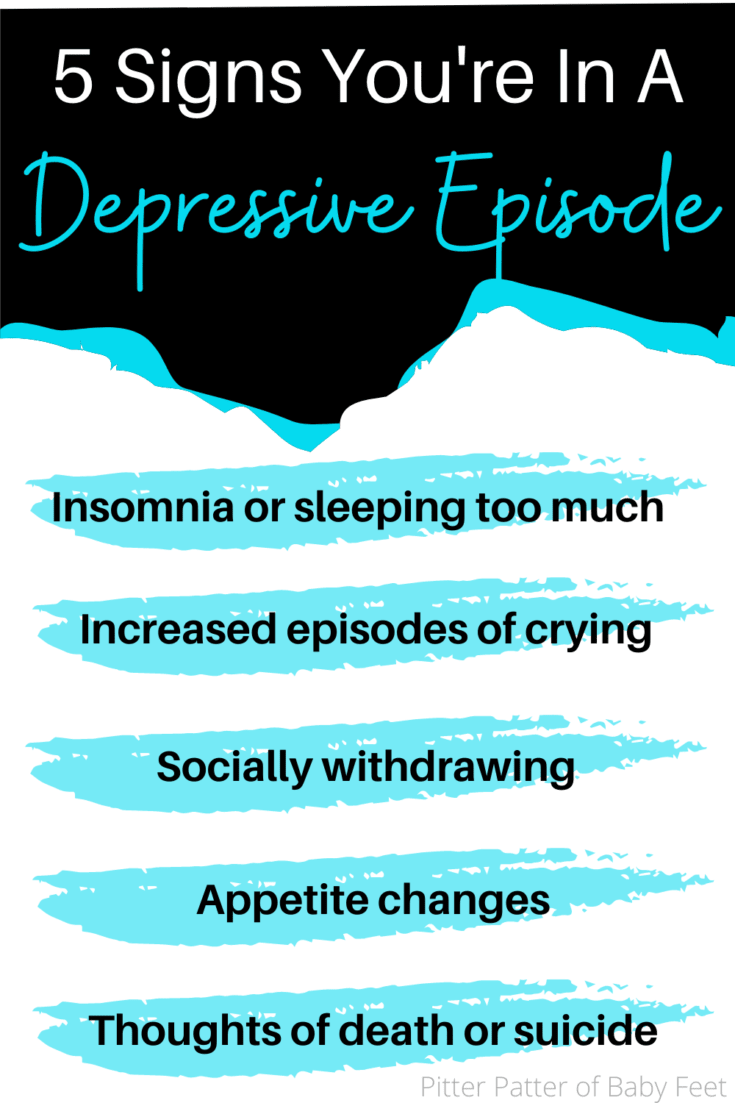Do you feel “off” lately? Like something is wrong, but you can’t pinpoint what it is. You’re just feeling down.
Although you may be on anti-depressants, you may be experiencing a depressive episode.
Anti-depressants are not a magic pill that takes depression away and heals you overnight. Depression is still there under the surface.
Pills like anti-depressants make depression symptoms bearable allowing you to live a fuller life with depression in control.
But sometimes, depression can resurface causing an influx of symptoms.
However, when a depressive episode occurs it can be hard to recognize because you’re on medication.
The first step to helping end a depressive episode is to recognize the signs and symptoms.
Disclosure: Bear in mind that some of the links in this post are affiliate links and if you click on them to make a purchase I will earn a commission. Keep in mind that I link these companies and their products because of their quality and not because of the commission I receive from your purchases. The decision is yours, and whether or not you decide to buy something is completely up to you.
What Is A Depressive Episode?
Changes in sleep
Depression tends to take sleep to the extreme. You either sleep too much or have trouble falling and staying asleep.
For many with depression, sleep is a way of escaping. Low energy and overall fatigue can also cause increased sleep of more than the recommended 8 hours.
Likewise, depression can also cause sleeplessness. Waking often and tossing and turning trying to get to sleep. This is miserable!
Stress is often the cause of insomnia for individuals with major depression.
If you went from getting a restful night’s sleep to now finding it difficult to relax and fall asleep or stay asleep, this is a sign of a depressive episode.
Increased crying
If you have been on anti-depressants for any amount of time you probably find it difficult to cry.
Kind of like the medication is numbing your emotions.
So while you may feel like crying, the medication doesn’t allow tears to actually flow.
This can cause emotions to build up that can later result in more depression symptoms or even anxiety.
Crying is a healthy way to express emotions of pain, sorrow, or even happiness.
If you’re in the midst of a depressive episode, you may find yourself crying due to stress or for no reason at all.
When you cry for no reason at all, it’s a definite sign that something is not right.
Related Articles: 8 Hidden Depression Symptoms You May Be Missing
50 Things To Help Depression When It Gets Hard
Social withdrawal
When was the last time you went out or text a friend? If it has been more than a week and you’re not answering texts and phone calls, it is likely a depressive episode.
Major depression causes an increase in social isolation. You feel internally sad, guilty, and downright miserable that you don’t want to talk to anyone.
If it becomes bad enough, social isolation can also make working difficult a well.
As you know by now, social isolation will only make depressive episodes worse.

Appetite changes
Depression increases cortisol, the stress hormone. When you’re under stress it not only affects your sleeping patterns but how you eat as well.
What a depressive episode looks like is different for everyone in terms of appetite changes.
For those with a history of eating disorders, their appetite may disappear in a depressive episode.
Others who normally eat healthy food, instead want to eat greasy comfort food they normally never eat.
It all depends on personality.
If you find that your appetite has lowered or increased significantly lately, you need to access if there is an actual cause behind it or if the cause is depression itself.
Thoughts of death
I saved this symptom for last because of how important it is.
Thoughts of suicide can enter your mind even if there is no intent behind these thoughts.
Although there may be no planning involved, that doesn’t mean you should just live with this symptom of depression.
This is the NUMBER ONE SIGN OF A DEPRESSIVE EPISODE! Please, do not ignore it!
While you may not have thoughts of suicide, having thoughts like…
- “Everyone would be better off without me”
- “I wish I wasn’t alive”
- “Why am I still living?”
Are all thoughts of death. While there are no visions of suicide, your brain is still telling you you do not want to be alive.
You cannot ignore these thoughts and hope to God they just disappear.
Although they could lessen with time, when you’re having these thoughts it is no way to live.
You shouldn’t be bombarded with feelings of hopelessness and wanting to die.
Your presence in this world is not by accident and you matter to many people in your life.
If you’re having thoughts of death or suicide even without intent or planning, you need to reach out immediately to a healthcare professional, a friend, a suicide hotline, a family member, or even a spiritual leader in your community.
Whoever you feel comfortable discussing your feelings with.
When this symptom of a depressive episode arises, it’s time to take action.
If you are on anti-depressants already, contact your doctor asap because it could mean you need to temporarily or permanently increase your current medication.
Or your doctor may recommend another medication added to your existing one or a medication switch.
Either way, you cannot ignore thoughts of death and/or suicide.
Related Articles: How Social Isolation Increases Depression Symptoms
What Is Cyclic Vomiting Syndrome?
Final Thoughts
It’s the worst feeling in the world to go through a depression episode while you’re on anti-depressants.
But that’s what a depressive episode looks like.
It’s a depressing state that pulls you even lower into the bowels of major depression.
It’s hard to understand how depressive episodes begin and why.
But the first step to getting out of an episode is to recognize the signs.
Sometimes when you’re experiencing these symptoms you may dismiss them or you may not notice them.
It could take a loved one saying something to you to recognize the struggle you’re going through.
But you are never alone! Others experience depressive episodes even with medication.
And if you are in need to help, all you need to do is reach out and get the help you need by contacting a friend, relative, or healthcare professional.


